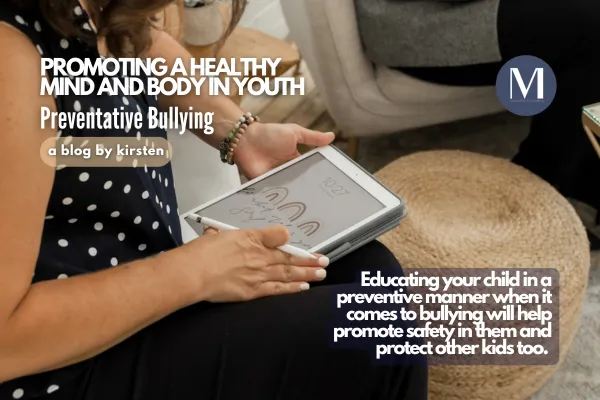the blog
A place for our team to share about topics they are passionate about, in hopes of allowing you to see and understand a bit more behind the faces on these pages.

Promoting A Healthy Mind and Body in Youth: Preventive Bullying
Educating your child in a preventive manner when it comes to bullying will help promote safety in them and protect other kids too. The first thing you need to do is share with your child or teen what bullying is, in an age appropriate way. Discuss how bullying is repeated words or behaviours that have the malicious intent to intimidate, harm, hurt or discourage another person. Bullying can be done online or in-person, and it often involves someone using dominance over someone else who is more vulnerable than them.
Teach them that bullying, whether a few times or continuous, can have long term effects on a child or teen’s mental or/and physical health. It can cause a young person to lose confidence in themselves, cause depression, low self esteem, disordered eating, anxiety, addiction, as well as affecting their physical body through stomach pains, headaches, weight loss or gain, poor sleep, delay development and affect how the person engages socially. Talk to youth about how their words and actions can either bring hope and healing or have hurtful and harmful outcomes that can greatly impact others long-term. Preventive bullying starts within the home, how you teach the kids in your life to engage with others can make a positive impact in their school, home and community.
It is also important for parents and caregivers to be able to recognize if your child or teen is being bullied. Often by the time the child reaches out for help, the bullying they have endured has most likely been going on for a while. Some signs that your youth is enduring bullying may include a decline in sports and academic performance, a decrease in social engagements, self-harm, unhealthy eating habits, isolating behaviours and increased anxiety. If you are noticing these things in your child or teen here are a few places you can start:
Listen without judgement, ask open ended questions, do not interrupt and stay calm, even if it is hard for you to do so, it is our responsibility as adults to be present and calm for our kids.
Talk to the school, community program or adult that is connected to the place where your child or teen is being bullied, work with them to support the situation.
Get your youth connected to helpful resources such as therapy, big sister or brother programs and new activities with safe people.
Be consistent, in these moments how you show your child or teen care can help promote healing. Be present without distractions, support them with one-on-one time everyday even if it’s short, and give them a hug that lasts at least 30 seconds, it will produce happy feelings that they really need.
Keep your communication open, remind them that they will not be in trouble, and that you love them and care about their well-being.
Office Location: 1200 Brock Street South, Whitby, ON. L1N 4L9
© Marquis Counselling & Consulting | ALL RIGHTS RESERVED | TERMS & CONDITIONS | PRIVACY POLICY
